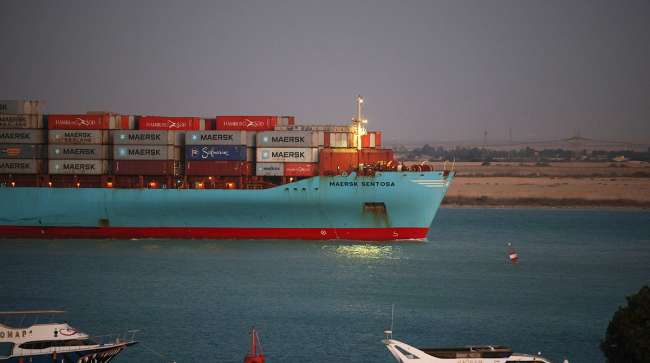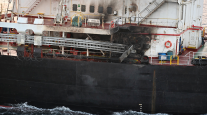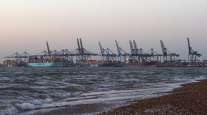Bloomberg News
Shipping CEOs See No Short-Term End to Red Sea Disruptions

[Stay on top of transportation news: Get TTNews in your inbox.]
The CEOs of two leading freight carriers said they expect Red Sea threats to disrupt shipping for weeks or months longer, extending delays and higher transport costs for companies dependent on goods flowing along trade lanes that link the world’s largest economies.
“For us, this will mean longer transit times and probably disruption of supply chains for a few months at least,” Vincent Clerc, the chief executive of A.P. Moller-Maersk A/S, said on a panel at the World Economic Forum in Davos on Jan. 17.
While Clerc said he hopes the unrest will end sooner than that, he said “it could also be longer because it’s so unpredictable how this situation is developing.” He called the situation in the Red Sea “extremely disruptive.”
Maersk ranks No. 5 on the Transport Topics Top 50 global freight companies list.

Clerc
Also speaking at Davos, DHL Group CEO Tobias Meyer said the rerouting of ships around southern Africa instead of the shortcut through the Suez Canal was leading to imbalances in container capacity. As a result, shortages might start to occur in about two weeks, hitting Asia in particular, he said.
“The back-flow is currently not happening at the pace people were planning for, so that’s something to monitor,” Meyer said.
Deutsche Post DHL ranks No. 3 on the Transport Topics Top 50 list of the largest global freight companies. DHL Supply Chain ranks No. 12 on the TT Top 100 list of the largest logistics companies in North America.
Among the other leaders watching the renewed threats to supply chains was European Central Bank President Christine Lagarde.
The things “I’m watching carefully” are “wage bargaining, profit margins, energy prices, and — hopefully not, but — the coming back of supply bottlenecks,” she told Francine Lacqua at an event at Bloomberg House in Davos on Jan. 17.
Monetary policymakers have reason to be wary. Disruptions to supply chains that began during the pandemic were partly behind an initial bout of inflation that occurred before energy prices spiked in the wake of the Russian invasion of Ukraine.
Want more news? Listen to today's daily briefing above or go here for more info
Global trade faces a major challenge in the Red Sea, where Iran-backed Houthi rebels have been escalating attacks on commercial ships for the last months. The Biden administration will put the Houthis back on a global terrorism list, officials said Jan. 17. The administration could rescind the designation if the group halts its attacks, according to a senior administration official who briefed reporters on the pending designation. It will take effect in 30 days, the officials said, allowing the U.S. to design sanctions in a way that avoids penalizing ordinary Yemenis. The West is attempting to deter further action while averting a wider Mideast conflict in a region already on edge due to the Israel-Hamas war.
Faced with longer journeys, the shipping industry has scrambled to raise spot rates for containers between Asia and Europe in recent weeks, leading to tripling of costs for cargo owners that is also affecting importers in the U.S.
According to Bloomberg Intelligence’s Lee Klaskow, transpacific shipping rates surged 58% to $4,375 per 40-foot container in the week ended Jan. 17, based on the Drewry Hong Kong-Los Angeles benchmark.




